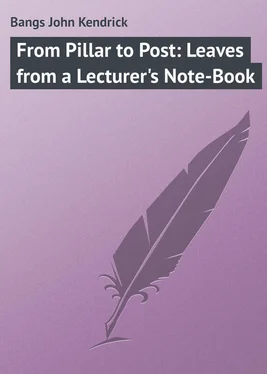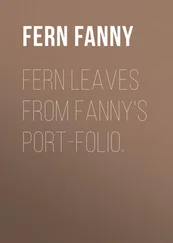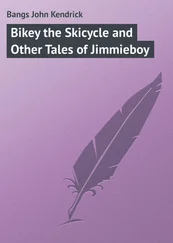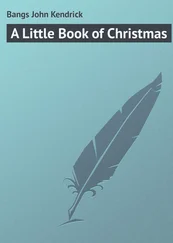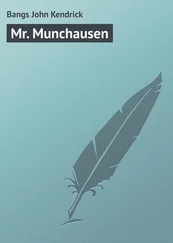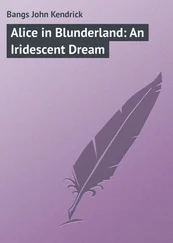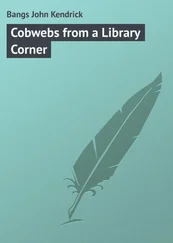John Bangs - From Pillar to Post - Leaves from a Lecturer's Note-Book
Здесь есть возможность читать онлайн «John Bangs - From Pillar to Post - Leaves from a Lecturer's Note-Book» — ознакомительный отрывок электронной книги совершенно бесплатно, а после прочтения отрывка купить полную версию. В некоторых случаях можно слушать аудио, скачать через торрент в формате fb2 и присутствует краткое содержание. Издательство: Иностранный паблик, Жанр: foreign_prose, на английском языке. Описание произведения, (предисловие) а так же отзывы посетителей доступны на портале библиотеки ЛибКат.
- Название:From Pillar to Post: Leaves from a Lecturer's Note-Book
- Автор:
- Издательство:Иностранный паблик
- Жанр:
- Год:неизвестен
- ISBN:нет данных
- Рейтинг книги:4 / 5. Голосов: 1
-
Избранное:Добавить в избранное
- Отзывы:
-
Ваша оценка:
- 80
- 1
- 2
- 3
- 4
- 5
From Pillar to Post: Leaves from a Lecturer's Note-Book: краткое содержание, описание и аннотация
Предлагаем к чтению аннотацию, описание, краткое содержание или предисловие (зависит от того, что написал сам автор книги «From Pillar to Post: Leaves from a Lecturer's Note-Book»). Если вы не нашли необходимую информацию о книге — напишите в комментариях, мы постараемся отыскать её.
From Pillar to Post: Leaves from a Lecturer's Note-Book — читать онлайн ознакомительный отрывок
Ниже представлен текст книги, разбитый по страницам. Система сохранения места последней прочитанной страницы, позволяет с удобством читать онлайн бесплатно книгу «From Pillar to Post: Leaves from a Lecturer's Note-Book», без необходимости каждый раз заново искать на чём Вы остановились. Поставьте закладку, и сможете в любой момент перейти на страницу, на которой закончили чтение.
Интервал:
Закладка:
The second incident occurred nearer home. It was in Ohio, at the time of the floods that wrought such havoc in Dayton and thereabouts in the spring of 1913. I had lectured the night before at Ironton, and on my way to Cleveland was to all intents and purposes marooned at Columbus. Much doubt existed as to whether traffic out of Columbus was at all possible, so completely demoralized were all the railroads centering there. It is a cardinal principle with lyceum workers, however, to make every possible effort to get through to their engagements at whatever inconvenience or cost. So in spite of the warnings of subordinate officials I took my chances and went out on a morning train which passengers took at their own peril, through scenes of dreadful desolation, and over a disquietingly soggy roadbed, until the train reached an Ohio city which I shall not identify by name here. While I have no hard feelings against it, or against any of its citizens, I cannot bring myself to speak of it in terms of "endearment," as I should much prefer to do.
At this point our train came to a standstill, and the announcement was made that it would be impossible to get through to Cleveland because all the bridges had been washed away. Motoring over for the same reason was out of the question, and the engagement was lost. I immediately repaired to the telegraph office and sent off several despatches – to the Cleveland people, announcing my inability to get through; to my agents, telling them of my plight; and to my family, assuring them of my safety. These telegrams broke my "financial back"; for when I had paid for them I found myself with only forty cents left in my pocket, marooned possibly for days in wettest Ohio, hungry as a bear, and not a friend in sight.
I did not worry much over the situation, however; for on several other occasions when I found myself penniless in the West and in the South I had not found any trouble in getting some one to cash my check. So, after assuring myself that my train would be held there for at least two or three hours before returning to Columbus, I set off blithe-heartedly to secure the replenishment of my pocket. In the heavy rain I walked up the main thoroughfare of the little city, and to my great relief espied a national bank on one of the four corners of its square. I walked boldly in and addressed the cashier, telling him my story with a few "well chosen words."
"I thought possibly," said I, as he listened without too great a display of interest, "that in view of all these circumstances you would be willing to take a chance on me, and cash my check for twenty-five dollars."
"Why, my dear sir," he replied, " this is a bank !"
I restrained a facetious impulse to tell him that I was surprised to hear it, having come in under the impression that it was a butcher shop, where I could possibly buy an umbrella, or a much needed eight-day clock.
"I know," I contented myself with saying, smiling the while. "That's why I came here for money."
"Well, you've come to the wrong place," he blurted out. " We are not running an asylum to give first aid to the injured! "
"Thank you, sir," I replied. "You are quite right, and perhaps I should not have asked such a favor – but I'll tell you one thing," I added. "To-morrow or next day when the Governor of this State issues his appeal for aid for the stricken, as he surely will, you will find that the financial men in that part of the world where I come from are running just such institutions, and when that golden horde for the relief of your people pours in from mine I hope it will make you properly ashamed of yourself, if you are not so already."
It was as fruitless as reading a Wordsworth sonnet on nature to a rhinoceros; for all he did was to grunt.
"Humph!" said he, and I walked out.
Another bank was soon found, where I secured not accommodation but a more courteous refusal. The president of the bank was one of the most sympathetic souls I have ever met, and would gladly cash anybody's draft for me; but my own check, that was out of the question. He was a trustee of the funds in his charge – poor chap, apparently without a cent of his own on deposit. However, he was courteous, and vocally sympathetic. He realized very keenly the difficulties of my position, and actually escorted me as far as the door to see me safely to the perils of the pave, expressing the hope that I would soon find some way out of my difficulty. I returned to the train, ate thirty cents' worth of sardines in the dining car, gave the waiter a ten-cent tip, and repaired to the smoking compartment absolutely penniless. A number of others were gathered there, and we naturally fell into discussing the day's adventures.
"Well," said I, "I've just had one of the strangest experiences of my life. I've been in all parts of the United States in the last eight years, and never until to-day have I found a place so poor in sympathy, and easy money, that I couldn't get my check cashed if I happened to need the funds. Why, I've known a Mississippi hotelkeeper who was so poor that his wife had to do all the chambermaid's work in the house, to go out at midnight to borrow twenty-five dollars from a neighbor to help me out; but here, with this flood knocking everything galley west, I can't raise a cent!"
And I went on and narrated my experience with the two national banks as recorded here.
"Well, by George!" ejaculated one of the men seated opposite to me, slapping his knee vigorously as I finished. "I'm an Ohio man, sir, and I blush for the State. I'll cash your check for you on your looks. How much do you want?"
"Twenty-five dollars," said I.
"All right," he said, pulling a well-filled wallet from his pocket, and counting out five five-dollar bills. "There's the stuff."
I thanked him, and drawing my check handed it over to him. He took it, and glanced at the signature.
" What? " he exploded. " The Idiot? "
This was the title of one of my books.
"Guilty!" said I.
"Here, you!" he cried, pulling his wallet again from his pocket, and holding it wide open, displaying a tempting bundle of ten-dollar bills within. " Here – just help yourself! "
And yet there are people in this world who ask if "literature" pays!
About the most Samaritan of the Good Samaritans I ever encountered I met in February last in one of the most flourishing of our northwestern cities. He was a Samaritan with what the modern critic would call a "kick" to him – or at least it struck me that way. As I made my way northward from Minneapolis to fill my engagement there I was seized with a terrific toothache which for the time being destroyed pretty nearly all my interest in life. The offending molar was far back in the region of the wisdom section, and inasmuch as it had been somewhat loose in its behavior for several days I decided to be rid of it. All my efforts to extract it myself were unavailing, and finally after a last desperate effort to pull it out myself I returned to my chair in the Pullman car and informed the Only Muse who upon this trip was Seeing America with me that our first duty on reaching our destination was to find a dentist and get rid of it.
"I hope you will be careful to get the right kind of a man," said she. "We can't afford any quack doctors, you know."
At this moment a charming woman seated on the opposite side of the car leaned over and said, "I do not wish to intrude, but I have seen how you were suffering, and I just overheard your remark. Now my son-in-law is a dentist, and we think he is a good one. He is coming to meet me at the station, and I think possibly he will be willing to help you."
I thanked the lady, and expressed the hope that he would.
On our arrival at the station the young man appeared as was expected, and my kindly chaperone presented the case.
Читать дальшеИнтервал:
Закладка:
Похожие книги на «From Pillar to Post: Leaves from a Lecturer's Note-Book»
Представляем Вашему вниманию похожие книги на «From Pillar to Post: Leaves from a Lecturer's Note-Book» списком для выбора. Мы отобрали схожую по названию и смыслу литературу в надежде предоставить читателям больше вариантов отыскать новые, интересные, ещё непрочитанные произведения.
Обсуждение, отзывы о книге «From Pillar to Post: Leaves from a Lecturer's Note-Book» и просто собственные мнения читателей. Оставьте ваши комментарии, напишите, что Вы думаете о произведении, его смысле или главных героях. Укажите что конкретно понравилось, а что нет, и почему Вы так считаете.
